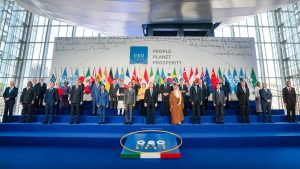At the end of October, Italy hosted the G-20 summit amid yet another year of pandemic. The multidomain impacts of the pandemic are reflected in the theme of the G-20 Summit this year: “People, Planet, Prosperity.” Our world and particularly G-20 nations are struggling with the devastating implications of the COVID-19 pandemic, which endangered both human security and economic well-being. At the same time, climate change is continuously threatening the safety of the global population.
Thus the G-20 Summit in Rome was indeed very crucial, as it was tasked with working not only to tackle the aftermath of the pandemic but, most importantly, to reaffirm the integrity and durability of multilateralism.
Indonesia’s President Joko Widodo, commonly known as Jokowi, attended the G-20 Summit with numerous important agenda items, such as participating at the Global Economy and Health session and meeting some of his counterparts. He managed to have sideline meetings with France’s President Emmanuel Macron, Australia’s Prime Minister Scott Morrison, and Turkey’s President Recep Tayyip Erdogan. The leaders’ meetings were highly relevant after nearly two years of virtual meetings and after the recent AUKUS-related developments in the region.
As health and the economy are very much interlinking during this pandemic, the G-20 leaders agreed to several approaches. They agreed to establish a stronger pandemic preparedness strategy, including creating health protocols among states and governance beyond the WHO for disease-mitigation and funding. Since the onset of pandemic, each nation tended to mobilize its own resources and focus on its territory, rather than prioritizing helping other countries in need.
Jokowi summed up the problem with a one-line message: “strengthening global health infrastructure.” His reference to public health management as “infrastructure” highlights that it must be governed in a stable, sustainable, and systemic manner, not just through temporary mechanisms.
Indonesia was also actively involved in the process of pushing a resilient, sustainable financial ecosystem. As one of Indonesia’s top concerns, Jokowi urged all G-20 nations to promote financial inclusion, particularly of small and medium-sized enterprises (SMEs) and people who are not reachable through banking services. Indonesia has repeatedly called for global financial reform, including by proposing the Global Financial Safety Net to help poor and under-developed countries survive amid the financial crisis and high debt burden.
Two of the issues in the G-20 declaration that are most associated with Indonesia are infrastructure investment and the digital economy. The G-20 leaders committed to develop further collaboration in mobilizing public and private investments in infrastructure development. Recognizing the essential role of technology in global economic recovery, the G-20 nations also agreed to reinforce international cooperation toward digital transformation and inclusion. Aligning with Jokowi’s remarks at the ASEAN Business and Investment Summit a week earlier, Indonesia is ready to contribute in driving the global and regional economy to be transformative and adaptive to the digital world.
Other clauses in the G-20 declaration covered the efforts to provide sustainable financing for mitigating and adapting to climate change. The leaders recalled the goal of mobilizing $100 billion per year through 2025, to be given by developed states to support developing ones in the fight against climate change. Indonesia, like other developing countries, insists that energy transition and all efforts to reach the net-zero emissions target must be affordable. Financing to deliver on climate change commitments is essential, and that is what Indonesia has been pushing for.
The G-20 in Italy had special significance for Jakarta, as Indonesia took over the chairmanship for the year of 2022. The leadership is politically a big test for Jokowi’s foreign policy engagement, which is mostly described as inward-looking and pragmatic. As president of the G-20 next year, Indonesia is not only responsible for proving the country’s economic resilience, but also demonstrating its influence in navigating the future direction of multilateralism. Some keywords will remain at the top of Indonesia’s G-20 guidelines: the promotion of a resilient, stable, sustainable, and inclusive global economy. The question is how those keywords will be translated into concrete and actionable policies at the end.
The G-20 in Indonesia will be convened after three years of pandemic, which means real and tangible economic recovery must no longer be optional. The international community will also be questioning the follow-up implementation of the pledges made at COP26. The G-20 in Italy was condemned for “lacking ambition and vision” and failing to meet the moment of COP26, particularly in setting up a blurry net-zero carbon emissions target. Similar condemnation might appear next year after the summit in Indonesia if climate outcomes remain unambitious and unclear.
The G-20 in Rome was also filled with shades of great-power contest. U.S. President, Joe Biden openly criticized China and Russia for not showing up at the summit or COP26 and not directly participating important dialogues. Indonesia will face an uphill battle in ensuring the strategic competition among large economies can be converted into constructive and healthy outcomes during its G-20 leadership year.
The declaration that followed the G-20 Summit in Rome is full of acknowledgments, affirmations, and repetitions of what the world’s most-wealthy nations have been doing in the past. On the positive side, there is a goal for these policies to be sustainable and integrated to other relevant resolutions; however, the G-20 needs to bring in new ideas and aspirations so then it would not be merely seen as “Christmas tree” with used decorations.
































